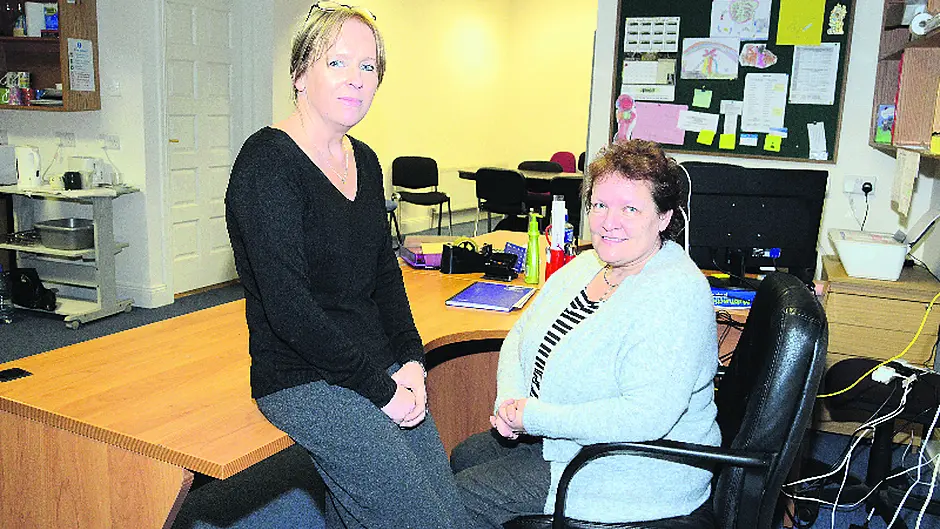Áilín Quinlan looks at how people in Clonakilty are benefitting from the local Community Employment Scheme which is giving them access to relevant training as well as ‘crucial’ on-the-job work experience
After moving with her family to West Cork 15 years ago, Helen Vaughan initially worked as a waitress – but with two young daughters to mother, the hours didn’t suit. Eventually the British native gave up restaurant work – and made what turned out to be a life-changing decision.
In 2009 she applied to join a Community Employment Scheme under a programme which had been in place since the late 1980s. Community Employment Schemes (CES) help long-term unemployed people re-enter the workforce through a practical and effective return-to-work routine.
The CES programme assists participants in developing both technical and personal skills – which can then be used in the workplace. And in Helen Vaughan’s case, it worked like a dream.
‘I was looking for a job. I’d worked with children previously as an au pair and as a nanny and I had enjoyed it, recalls the 47-year-old Nottingham native.
In January 2010 she joined the West Cork Traveller & Environmental Project in Clonakilty – one of two CES programmes which now operate from an office in Rossa Street – under which she started part-time work in Timoleague Community Playschool.
Helen stayed at the playschool for three years, during which time she studied for a Fetac Level Five qualification in childcare – which as part of the scheme was funded by the State – completing it in 2013.
Now she works full-time as a playschool leader/assistant at the playschool – a job for which, she says now, being a CES participant was critical:
‘The Community Employment scheme was crucial. It got me the right training and gave me the necessary on-the-job work experience. I was also encouraged to earn a qualification – in fact the CE scheme got me into a full-time job in the career I wanted to go into.’
The mother-of-two recently completed her Fetac Level Six qualification in childcare – which is required to progress into management in the childcare area – and is currently considering earning a full degree.
‘The Community Employment Scheme got me into the career I want, and it all worked out really well. If I hadn’t done it, I think I’d still be trying to find part-time work.’
The programmes are very successful, reports Sinead Burton, supervisor on Clonakilty’s West Cork Traveller and Environmental Project.
‘Participants are allowed work outside of their 19.5 hours per week while on the scheme and this doesn’t affect their weekly wage with CE,’ she says, adding that participants are also entitled to four weeks external work experience with a private company every year they are on the scheme.’
Under the CE programme, which is sponsored by groups wishing to benefit the local community such as the Tidy Towns Committees, participants work 19â€ours per week or 39 hours per fortnight in such areas as Catering & Household, Maintenance & Groundskeeping, Office Work, Youth Work/Outdoor Education, Retail Assistant, Support Workers, Gardening or Caretaker.
Training is available to participants in areas relevant to their work such as Youth Work, Chainsaw, Horticulture, Driving and HGV, Food Hygiene, Safe Pass, Manual Handling, Computers and Child Protection.
‘The list of training choices is vast. We tailor-make training programmes to suit individual and group needs,’ says Burton.
In 2014 Timoleague resident Cormac McHugh (37) joined the same Community Employment Scheme as Helen.
He now hopes to set up his own business as a stove installer and chimney sweep within the next few months.
It’s been a marvellous experience, reports Cormac who has been carrying out landscaping work in Kilbrittain as part of the project.
‘I carry out caretaking duties around the village – grass-cutting, hedge-cutting, weed-spraying, and we are also working on stone-wall building. I’ve also completed a number of course including chainsaw operation, welding and stove installation. I found the CE scheme very worthwhile – it gave me pride in the local village. Doing the work and taking the courses gave me confidence in myself. I feel the CE Scheme put me back on my feet. It showed me that I could develop practical skills which are in demand in the marketplace. It’s a great incentive get out of bed in the morning to do work you are interested in doing – plus it’s something you’re skilled at.’
There are many success stories like those of Helen and Cormac, says Joanna Brown, supervisor of The Clonakilty Area Sports project, the second scheme based at Rossa Street.
Large numbers of participants have returned to work following a stint on a Community Employment Scheme – usually as a result of up-skilling themselves while on the project.
Participants have found jobs as drivers, gardeners, couriers, have secured positions in shops, factories and hotels as well as in the care sector, and the areas of tree surgery and stove installation.
However, the benefits go both ways, says Sean O’Donovan, a member of Timoleague Tidy Towns Committee, which has provided work experience for countless Community Employment Scheme participants over many years.
The Community Employment Schemes benefit the group enormously because as a voluntary group they would not have the manpower do all the work:
‘It involve grass cutting, upkeep of the village and surrounds and maintenance of the hall. Generally the workers stay for a maximum of three years, and the work they carry out is absolutely invaluable to us – it’s work we cannot carry out ourselves. This is a very good scheme, and very important. Over the years we’ve had quite a number of Community Employment participants who have progressed on to fulltime employment.’
• To find out more about Community Employment Schemes in your area, contact your local Department of
Social Protection office.







